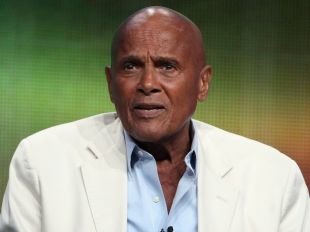
Near the end of the documentary Sing Your Song, Harry Belafonte is riding in a car with Bo Taylor, a former Los Angeles gangbanger turned antigang activist, and Taylor says to his passenger, "I remember what you said once, when you said, 'From the time I go to sleep to the time I wake up, I seek out the injustices done to humankind.'"
Belafonte nods and says, with gentle and unforced conviction, "I just get up in the morning and I can't let them win. That's it."
This is hardly the most powerful or memorable moment in Sing Your Song, but it summarizes Belafonte's public life with superb concision -- while he gained his fame as an entertainer, he sees his real work as using his gifts to help those who have been politically or economically shunted off to the margins, and as long as there is unfairness or suffering in the world, his conscience won't allow him to ignore it. Created with the participation of Belafonte and his family, Sing Your Song tells a remarkable story of an artist and activist who has repeatedly shown a rare willingness to put his ideals ahead of concern for his career.
Harry Belafonte provides his own narration for his story, and in Sing Your Song he makes it clear that his art and his passion for justice have been intertwined since childhood. As a young boy, Belafonte's single mother sent him to live with family in Jamaica, and he first learned some of the calypso tunes that would later make him a star as they were sung by laborers working in grinding poverty.
Belafonte never considered a career in the arts until he was given a pair of tickets to a performance at an African-American theater workshop, which awakened him to the power of entertaining an audience. After studying at New York City's New School Dramatic Workshop in the late 1940s (where his classmates included Marlon Brando, Walter Matthau, and Tony Curtis), Belafonte began working as an actor and a singer; he also developed a passionate interest in American and Caribbean folk music, and these talents led him to a successful career on stage, in the movies, on television, and as a recording artist. But Belafonte was always keenly aware of the political, social and racial divides in the United States, particularly after playing Las Vegas resorts where he could sell out the main showroom but wasn't permitted to rent a room, or while touring the Deep South, during which his show was banned in some venues because the cast was integrated. Spurred on by the example of the actor, singer, and activist Paul Robeson, Belafonte committed himself to use his success to send a message about the need for equality in America. He became an early and passionate supporter of Dr. Martin Luther King Jr., not only speaking on King's behalf, but also marching with him, helping to raise money and awareness for his work, and in one harrowing story, joining Sidney Poitier on a mission to escort needed funds to civil-rights workers in 1964 following murders tied to the Ku Klux Klan. Since the '60s, Belafonte has remained passionate about issues of social justice, fighting on behalf of Native Americans, protesting America's involvement in a number of overseas wars, speaking out against nuclear weapons, organizing famine-relief programs (he spearheaded the recording of USA for Africa's "We Are The World"), joining the crusade to end apartheid in South Africa and free Nelson Mandela, and serving as an advocate for antigang groups and prisoner's rights in the United States.
It doesn't take long to realize that Harry Belafonte is proudest of his work as an activist, and as a consequence, Sing Your Song devotes significantly more screen time to the causes he supports than his career as an actor or singer. Even still, the film does include plenty of clips from his early films and television appearances, and they're a powerful reminder of why Belafonte became such a major star in the 1950s and '60s. His voice was nothing short of magical in its ability to spin tales and create characters, and he had a powerful, infectious charisma that, coupled with his good looks, would have made him a natural for romantic roles if Hollywood had been more willing at the time to create love stories that dealt seriously with black characters. Belafonte tells his story with intelligence and a sense of drama, as well as a real enthusiasm for what he believes in, and while it would be easy for the movie to seem self-congratulatory given the number of remarkable people whose paths he crossed, he clearly believes that the cause is more important than the man who espouses it. In addition, Belafonte is honest enough to deal frankly, if briefly, with the negative toll his career, his commitments, and the stress of being in the public eye took on his first two marriages and his relationships with his children.
Director Susanne Rostock assembles the elements of Belafonte's story with care and skill, and rather than celebrate past glories, the film deals with the man and his beliefs in the present day, as Belafonte, now in his eighties, continues to work for peace and justice in the 21st century. At an antiwar rally, he tells a reporter, "I live in a perpetual state of optimism. If you don't have optimism, you can't nourish hope. And the world is in need of hope, the world is in need of vision, and those of us who have a little sight left like to give us much vision as we can." Sing Your Song is an inspiring film that speaks volumes about Belafonte, and anyone who has ever admired his work as an artist or an activist should make a point of seeing it.
